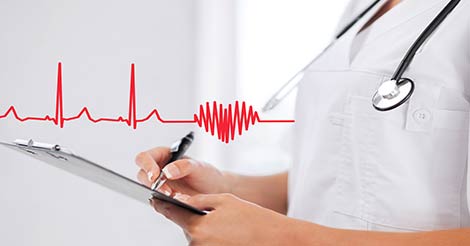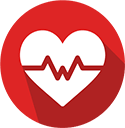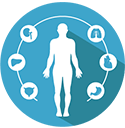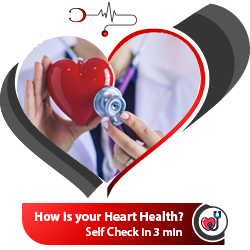Heart Disease Diagnosis & Treatment
Gone are the days, when the doctors would do the physical examination, check blood pressure, pulse and other vitals are tell you if you are fit or not. With the advancements in medical science, it is much easy to diagnosis and treats many critical conditions. The heart is one of the most important organs of our body, which works non-stop throughout our life. Let's discuss in details about the diagnosis tests done for detecting structural and functional abnormalities in heart along with the types of heart disease treatment.

Diagnostic Tests for Heart Disease
Diagnosis of heart diseases can be done by the following tests in a heart health checkup:
-
Electrocardiography (ECG):
ECG or Electrocardiogram Test is used to measure the electrical activity of your heart.Indications for ECG
- Identify the prognosis of a heart condition
- Chest pain or palpitations
- The size/position of heart and chambers of the heart
- Heart rate and rhythm abnormalities
- Pre-operative tests mandatory before a surgery
- Personal and family history of heart problems
-
Stress Electrocardiogram:
is an exercise electrocardiogram (EKG or ECG) that reads the changes in your heart while you are exercising. It is also known as "stress test" or a "treadmill test.Indications for Stress Electrocardiogram
- Symptoms which indicate myocardial ischemia
- In a known or suspected patient of heart disease
- To check the heart’s functional capacity
- Symptoms which indicate myocardial ischemia
- In a known or suspected patient of heart disease
- To check the heart’s functional capacity
-
Holter Monitoring:
is a battery-operated portable device that measures and tape records the heart’s activity.Indications for Holter Monitoring
- Continuously measuring and tape record the heart’s activity (ECG) for 24 to 48 hours or longer
- Irregularities in the heart rhythm
-
Heart Echo Test:
is also known as 2D echocardiography, 2D echo and diagnostic cardiac ultrasound. In this test the sound waves to create images of your heart’s internal structures.Indications for Heart Echo Test
-
Observing/Calculating
- Cardiac output
- Ejection fraction
- Diastolic function
-
Diagnosing the following:
- Anginas
- Cardiac failure with a possibility of coronary artery disease
- Heart valve disease
- Recurring and unidentified chest pain
-
Necessary for planning:
- Bypass surgery
- Angioplasty
- Stent placement
-
Cardiac Imaging Scans:
-
Cardiac Magnetic Resonance Imaging (MRI):
creates detailed pictures of the structures within the heart with the help powerful magnetic radio waves. It is used to identify heart disease and to assess the heart’s internal structure and its functionalities mostly in congenital heart disease patients. -
Cardiac Computerized Tomography (CCT) Scan:
is used to assess the heart and the blood vessels.Indications of Cardiac Computerized Tomography (CCT) and Cardiac Magnetic Resonance Imaging (MRI) scans
- Coronary Artery Disease (CAD)
- Congenital heart defect/identifying the presence of a Patent Foramen Ovale (PFO)
- Cardiomyopathy
- Cardiac failure
- Pulmonary hypertension
- Constrictive pericarditis
- Cardiac neoplasm or thrombus
- Suspected ischemic heart disease
- Valvular disease
- Cardiac Shunts
Heart Disease Treatment:
After understanding the heart disease diagnosis tests, let’s now discuss some of the different treatment methods. Generally, the treatment plan can be classified into 2 parts.
-
Treatment by Medicines:
Where the heart diseases are treated by medicines. This treatment is based on the actual. -
Invasive Treatment/Treatment by Surgery:
Where the heart diseases are treated by surgery. For example a bypass surgery, angioplasty etc. -
Combination of Treatment with Medicines and Invasive Treatment:
When neither of the above treatments work single handedly, then cardiologists use the combination of medicines and surgery.
Heart Health Checkup:
To feel good from your head to toe, you need to have a healthy heart beat. For this, you need a heart health checkup. The early diagnosis of a heart disease not only helps in the prevention of any emergencies due to a heart condition and also helps in prompt treatment of that condition. Indus Health Plus, the preventive health checkup specialists; help you to know your heart status.Fill the query form to know about heart checkup, medical check-up & other health checkup packages and we will get back to you at the earliest.










